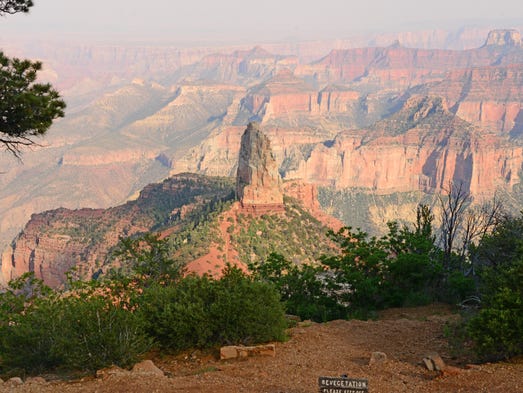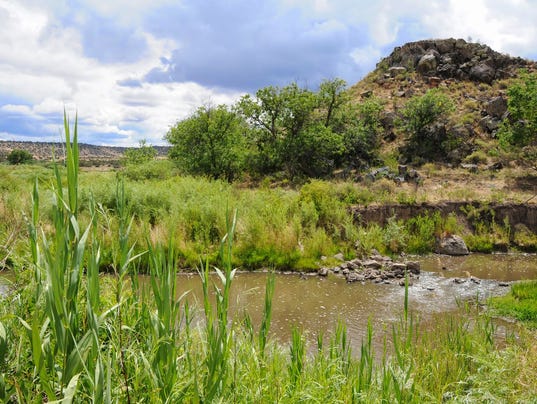Source: Arizona Daily Star – September 5, 2016
Sometimes a good editorial cartoon says more than an entire column. A good example, by Jeff Stahler, appeared in the Arizona Daily Star on Aug. 27. A family listens to ghost stories by the campfire. Father assumes his scariest pose and says: “And then the decided to privatize the national parks.”
It’s a story that’s becoming reality in state and national parks and public lands. A complex multifaceted issue with strong proponents on each side. Good information including pros and cons is available online. I can’t begin to cover the entire subject but in 30-plus years of camping in state, National Park and Forest Service campgrounds we’ve seen the good the bad and the ugly of public vs. contracted private operation.
Fool Hollow State Park on the edge of Show Low is the gold standard for how a park should be run. We’ve averaged at least two visits per year over more than 25 years and always found it to be fastidiously clean and well maintained. Best of all we’ve never been bothered by loud music or rowdy behavior. In mid-summer our favorite high-country campgrounds, Winn, and Apache Trout at Big Lake, are run by the same private company under contract to the U.S. Forest Service.
at least two visits per year over more than 25 years and always found it to be fastidiously clean and well maintained. Best of all we’ve never been bothered by loud music or rowdy behavior. In mid-summer our favorite high-country campgrounds, Winn, and Apache Trout at Big Lake, are run by the same private company under contract to the U.S. Forest Service.
A noteworthy difference between state-run Fool Hollow and contract-operated Winn and Big Lake is the much larger ratio of campers to camp hosts at Winn and Big Lake. Good for the contractor’s bottom line but what about the quality of camping experience. It depends on the camp hosts. Over many years camp hosts at Winn have been some of nicest people we’ve ever had the pleasure of knowing. Friendly, helpful, courteous and conscientious.
At Big Lake it’s been a mixed bag. Camp hosts included one who came on like a marine drill sergeant. Another required a verbal kick in the fanny to enforce camp ground rules when children drove a go-cart up and down the road subjecting campers to nerve-racking noise and clouds of dust while the camp host did nothing. On another visit an overloaded trash bin stunk so badly that you could smell it half a mile away.
When camping experiences depend on the quality of hosts, we deserve better than luck of the draw whether in state, federal, or contract-operated facilities. Oversight is the key. On site-operators will be as good or as bad as the standards they are held to by campground owners, and that would be us. When they take the oath of office, our elected officials accept the awesome responsibility of managing our public lands for present and future generations. When they fail as stewards it’s because we’ve allowed them to.
As we celebrate the 100th birthday of our National Park Service we can be thankful for the foresight of private citizens and elected officials who created a network of protected public lands that’s the envy of the entire world. We must also accept responsibility for the $12 billion of deferred maintenance in our national parks, and many million more in our state parks. Can private contractors be part of the solution? With effective oversight maybe so; but they must be held to a higher standard than what we’ve experienced. It’s an election year. On the presidential level it may be little more than a name-calling contest, but many other state and national offices are up for grabs. If we want a well-maintained network of parks open and accessible to all now is the time to speak up.
William Thornton is a second-generation native Arizonan, conservationist and outdoor enthusiast. He serves on the boards of the Arizona Heritage Alliance and Friends of Ironwood Forest. Contact him at cactusworld@msn.com
 pply by clicking here:
pply by clicking here:  pledged to manage our lands in a balanced way that protects our “irreplaceable environment” and noted that the “Republican perspective” is in agreement with Theodore Roosevelt’s view that the conservation of the nation’s natural resources is our most fundamental challenge.
pledged to manage our lands in a balanced way that protects our “irreplaceable environment” and noted that the “Republican perspective” is in agreement with Theodore Roosevelt’s view that the conservation of the nation’s natural resources is our most fundamental challenge. [Source: Arizona Republic, February 29, 2016] –Wildlife’s political life seems to have come full circle since 1990 when by a 2-to-1 margin Arizona’s voters gave us the Heritage Fund, $20 million from the Lottery to be spent solely for Arizona’s parks and wildlife.
[Source: Arizona Republic, February 29, 2016] –Wildlife’s political life seems to have come full circle since 1990 when by a 2-to-1 margin Arizona’s voters gave us the Heritage Fund, $20 million from the Lottery to be spent solely for Arizona’s parks and wildlife.
You must be logged in to post a comment.